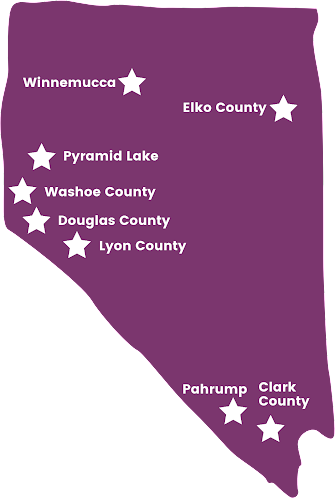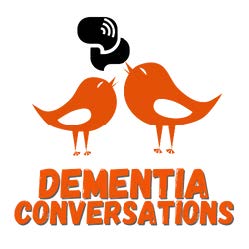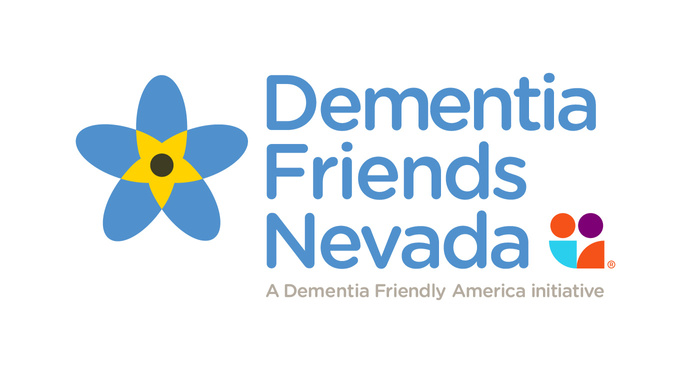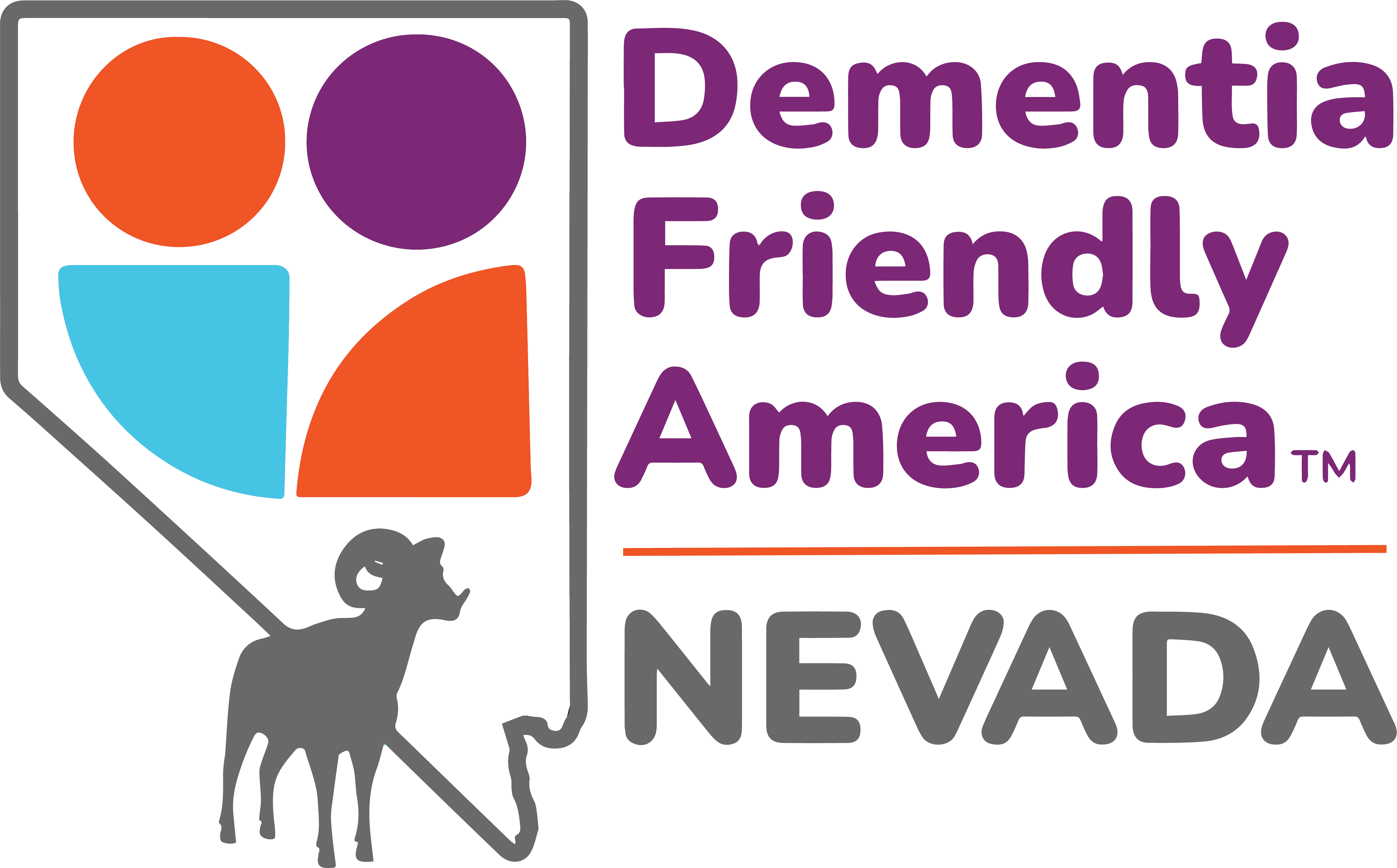Dementia Friendly Nevada
The Dementia Friendly Nevada initiative aims to cultivate and strengthen communities in becoming more respectful, educated, supportive and inclusive of people living with dementia and their care partners.
In 2016, Dementia Friendly Nevada launched with funding from the Nevada Aging and Disability Services Division. It began as a group of four communities committed to becoming more dementia-friendly-and-inclusive. As of 2023, with additional funding from the Nevada Division of Public and Behavioral Health eleven communities have now joined the effort, and that number continues to grow.
Each Community Group follows the Dementia Friendly America process, convening diverse stakeholders together to analyze the strengths and gaps of their community, plan goals and actions to address identified gaps, and evaluate their progress.
Don’t see your community on this map? Reach out to the DEER Program at DEERProgram@unr.edu or (775) 682-9444 to discuss bringing the Dementia Friendly initiative to your area!

Explore our Dementia Friendly Nevada Values!
Dementia Friendly Nevada is guided by a deep belief that each person living with dementia remains, and will always remain, a full human being and their rights as a citizen are, and shall always be, intact. To guide our dementia-friendly and inclusive efforts, we offer a set of values which can help serve as a type of ethical roadmap for restoring and ensuring fundamental rights and opportunities to people living with dementia who have been disenfranchised by a prevalent view that discounts and diminishes their value and contributions to our communities and state.
1. People can live well with dementia.
People living with dementia are not defined by their diagnosis. In order to support each person in living well with dementia, we must break the stigma of dementia and focus on strengths instead of just losses. Rather than using terms like “dementia sufferer” or “Alzheimer’s patient” that focus on the tragedy of dementia, we can honor the humanity of all people by using person-first language, like “people living with dementia.” People can live well with dementia when they are offered opportunities for meaning, purpose, and growth.
2. Partnering with people living with dementia and honoring each individual’s live experience opens a world of possibilities.
People living with dementia are the genuine experts in the experience of living with dementia. Their perspectives, wishes, and preferences should always be respected in the decisions that affect their lives. Doing so requires understanding each person as a unique human being, as generalizations based on “age” or “stage” are limiting and often wrong. After all, if you know one person living with dementia, you only know one person living with dementia.
3. Recognizing, validating, and responding to all forms of expression as meaningful communication supports well-being.
People living with dementia can and do communicate and express themselves meaningfully throughout their dementia. What people talk about as “behavioral and psychosocial symptoms of dementia” (or “BPSDs”) are often forms of communication, where people living with dementia are expressing their identity, preferences, or unmet needs in the best way they can. Instead of seeing these so-called “behaviors” as problems, care partners and professionals should seek to understand, validate, and respond to what a person is trying to say through their actions.
4. When supporting a person living with dementia, we should always strive to see the world from their perspective.
“Redirection” is a code-word for distracting or charming someone living with dementia into doing what you want them to do. Instead of redirecting, care partners and community members should respond supportively and seek to understand the world from the other person’s perspective.
5. People living with dementia have the right to freedom.
Sometimes what makes care partners feel safe and secure makes people living with dementia feel trapped and anxious, including locked doors. People living with dementia have the right to access care and support in the least restrictive manner and should never be segregated. Residential care settings should not merely be “homelike;” they should be actual homes that uphold the right to self-determination. To support this right, safety and freedom should always be balanced, and connections to community should always be protected and promoted. We must always seek to foster security while upholding personal choice, and there are many ways to promote safety besides locked doors.
6. People living with dementia can grow and thrive.
Though most forms of dementia are degenerative, people living with dementia can continue to grow and thrive when care partners and organizations honor the right to autonomy and privacy and avoid protective measures that medicalize, monitor, and control all aspects of everyday life.
7. Proactive supports and services reduce the need for reactive interventions.
Communities and service agencies should offer affordable, easy-to-access help and support for everyone. With a focus on early detection and proactive community-based supports and services, we can avoid the need for expensive and reactive medical interventions and institutional care settings. When institutional care is necessary, people living with dementia should have access to affordable, high-quality residential care that nurtures each person’s well-being and upholds their personal decision- making to the greatest extent possible. This requires having enough staff on-hand to fully support each person.
8. A dementia-inclusive community is a strong community; elders need communities and communities need elders!
Just as the Americans with Disabilities Act ensures ramps for people living with physical disabilities, it should also ensure that communities provide adaptations and supports (in essence, “cognitive ramps”) for people living with dementia and other cognitive disabilities. When we support and include people living with dementia, it enhances their well-being. It also makes our communities stronger. Elders need communities and communities need elders!
Hear from DFNV Members about the initiative!
Chuck McClatchey and Nancy Nelson, both of whom have been living with dementia or MCI for 10+ years, talk about their participation in Dementia Friendly Nevada as part of the “The Gift of Giving” series.
Here are just a few examples of the types of actions Dementia Friendly Nevada Community Groups have implemented since 2016:
Community Awareness
Many Dementia Friendly Nevada Community Groups spread awareness-raising and stigma-breaking education through the Dementia Friends program, Dementia Friendly Clark County’s Community Awareness Training, and other engaging programs. For more information on the Dementia Friends program, click here.
Tribal Resources
The Pesa Sooname Advisory Group – the Pyramid Lake Paiute Tribe’s Dementia Friendly Nevada Community Group – hosted the second Nevada Tribal Summit on Brain Health and Dementia in 2023. Click here to view the presentations. For more tribal resources, download the Pesa Sooname Resource Notebook.
Respite
Dementia Friendly Elko County partnered with Nevada Rural Counties RSVP and the Terrace at Ruby View to design and offer a weekly respite program called Friends’ Day Out which meaningfully engages people living with dementia with each other while their care partners attend to other matters. The program features the evidence-based Java Music Club peer support program to help build lasting relationships among group members.
Care Partner Education
Many Community Groups host offerings of the Bravo Zulu: Achieving Excellence in Relationship-Centered Dementia Care program which provides 12 hours of comprehensive dementia education. For more information about the Bravo Zulu program, click here.
Peer Support
Dementia Friendly Washoe County organized a monthly gathering space for people living with dementia and their guests called the Open Door Café. The program opens a friendly and inviting space where people living with dementia can talk with others about whatever topics might be of interest, whether dementia-related or not, without the fear of judgment.
Resources in Spanish
Dementia Friendly Nevada’s materials are developed, they are translated into Spanish. This includes the incredible Navigating the Dementia Journey Notebook, written by members of Dementia Friendly Clark County.
Active Engagement
Dementia Friendly Washoe County has partnered with The Ballroom of Reno to offer Dance with Me, a program specially designed to aid in mental, physical, and emotional health of the elders in our community who face depression and isolation as they age. For more information, click here.
Brain Health
One of the best ways to support brain health is to stay active, and Age- and Dementia-Friendly Winnemucca hosts an annual Sprint Triathlon and Turkey Trot to help community members do just that! They also built a dementia-friendly and inclusive fitness park to offer Winnemuccans an accessible opportunity for on-demand physical activity.
Early Diagnosis
Dementia Friendly Clark County partnered with nursing students to connect hundreds of Nevadans in the greater Las Vegas area with cognitive screens. These screens prompted many to pursue a more comprehensive cognitive assessment.
Community Supports
Dementia Friendly Clark County developed a helpful Nevada-based resource guide of community-based supports for people living with dementia and care partners called Navigating the Dementia Journey. It also provides an overview of dementia and information about developing a personalized care plan. For more information, click here.
Community Awareness: Many Dementia Friendly Nevada Community Groups spread awareness-raising and stigma-breaking education through the Dementia Friends Information Session. For more information on the Dementia Friends program, click here.
Tribal Resources: The Pesa Sooname Advisory Group – the Pyramid Lake Paiute Tribe’s Dementia Friendly Nevada Community Group – hosted the second Nevada Tribal Summit on Brain Health and Dementia in 2023. Click here to view the presentations. For more tribal resources, download the Pesa Sooname Resource Notebook.
Respite: Dementia Friendly Elko County worked with Nevada Rural Counties RSVP to design and offer a four-hour respite program called Friends’ Day Out that opens a space where people living with dementia can meaningfully engage with each other while their care partners attend to other matters. The program employs the evidence-based Java Music Club Peer Support Program to help build lasting relationships among group members.
Care Partner Education: Many Community Groups have organized offerings of the Bravo Zulu: Achieving Excellence in Relationship-Centered Dementia Care program that brings participants through 12 hours of comprehensive education focused on dementia care and support.
Peer Support: Dementia Friendly Washoe County organized a monthly gathering space for people living with dementia and their guests called the Open Door Café. The program opens a friendly and inviting space where people living with dementia can talk with others about whatever topics might be of interest, whether dementia-related or not, without the fear of judgment.
Resources in Spanish: All of Dementia Friendly Nevada’s materials are translated into Spanish as they become available. This includes the incredible Navigating the Dementia Journey Notebook written largely by members of Dementia Friendly Southern Nevada Urban.
Active Engagement: Dementia Friendly Washoe County has partnered with The Ballroom of Reno to offer Dance with Me, a program specially designed to aid in mental, physical, and emotional health of the elders in our community who face depression and isolation as they age. For more information, click here.
Brain Health: One of the best ways to support brain health is to stay active, and Age- and Dementia-Friendly Winnemucca hosts their annual Sprint Triathlon and Turkey Trot to help community members do just that! They also build a dementia-friendly-and-inclusive fitness park to offer Winnemuccans the opportunity for some on-demand healthy activity.
Early Diagnosis: Dementia Friendly Clark County helped connect hundreds of Nevadans in the greater Las Vegas area with cognitive screens that served as the first step for many to pursue more extensive cognitive assessment.
Community Supports: Dementia Friendly Pahrump constructed a resource library of hundreds of materials in English and Spanish for all ages to support and educate Pahrump community members whenever they might have questions about dementia or approaches to care and support. The materials are available for check-out free-of-charge, just like a public library!
Watch the new
DFNV Public Service Announcements!
Created by the Nevada Division of Public and Behavioral Health in partnership with Dementia Friendly Nevada and the Dementia Engagement, Education, and Research (DEER) Program
to spread positive messaging about dementia and care partnership.
Dementia Friendly Nevada Statewide Program
In addition to the incredible work being done on a local level, Dementia Friendly Nevada also hosts programs at a statewide level:

A twice-weekly, Zoom-based public discussion forum for people living with dementia and care partners to share their experiences and explore practical strategies for living well with dementia.

A 90-minute information session offered in English and Spanish, that covers the basics of dementia, strategies to reduce the risk of developing dementia, activities to better understand the experiences of people living with dementia, and approaches for effective communication.

Statewide Meetings
The whole Dementia Friendly Nevada community gathers monthly online to learn together, reflect on successes and new opportunities, strategize for the future, and share exciting news from across our state!
The DEER Program proudly provides administrative support to Dementia Friendly Nevada
